Exploring Benner's 'Novice to Expert' Theory in Nursing Practice
VerifiedAdded on 2020/10/22
|9
|1995
|457
Essay
AI Summary
This essay provides a comprehensive discussion of Patricia Benner's 'Novice to Expert' theory in nursing, outlining the five stages of skill acquisition: novice, advanced beginner, competent, proficient, and expert. It explores the practical implementation of the theory in nursing practice, highlighting its importance in developing skilled nursing practices through experience and education. The essay also examines the theory's effectiveness in clinical decision-making and its role in mentorship programs and career development within healthcare organizations. Four referred journal articles utilizing Benner’s theory in nursing practice are discussed in the paper. The paper concludes by emphasizing the theory's contribution to transforming novice nurses into expert practitioners through a combination of formal education and practical experience.
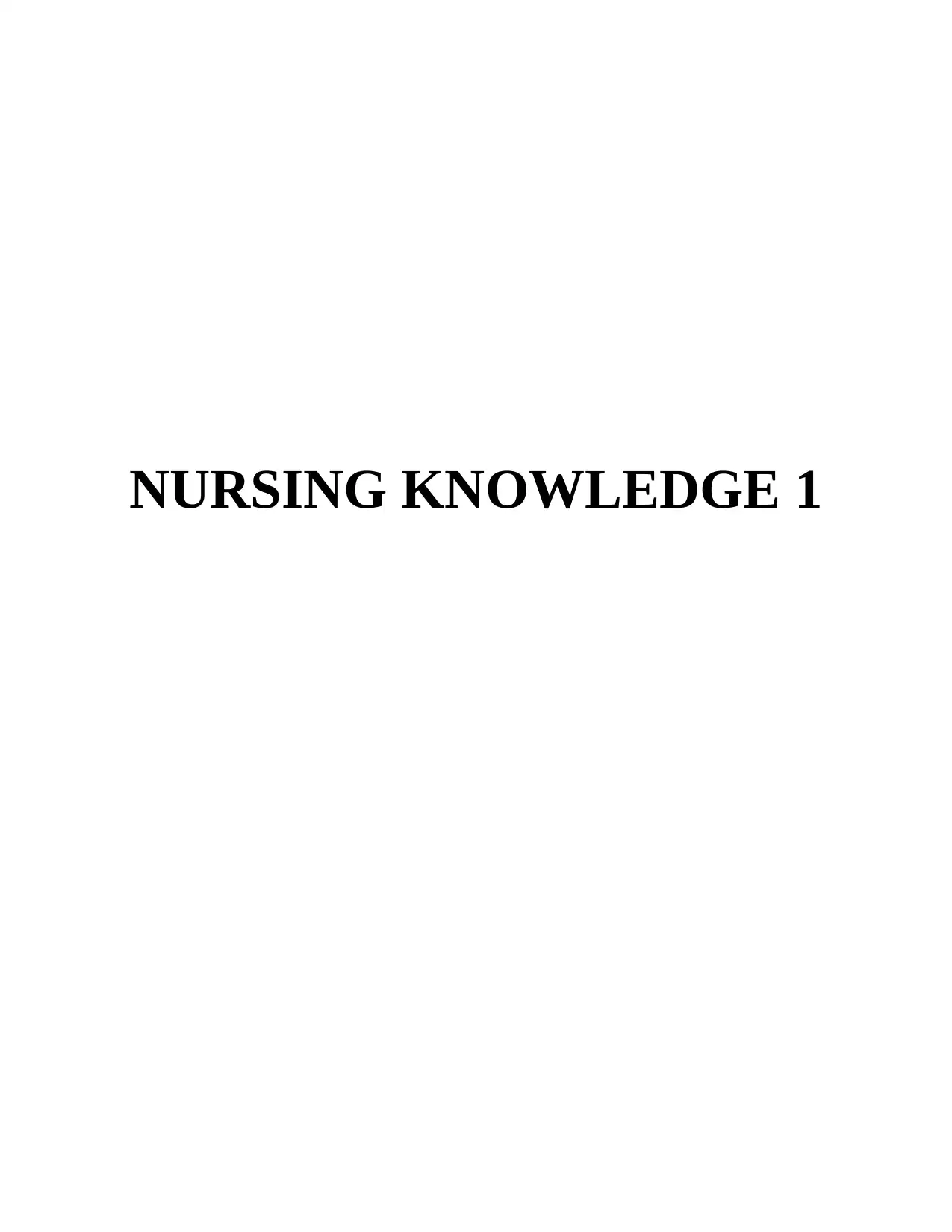
NURSING KNOWLEDGE 1
Paraphrase This Document
Need a fresh take? Get an instant paraphrase of this document with our AI Paraphraser
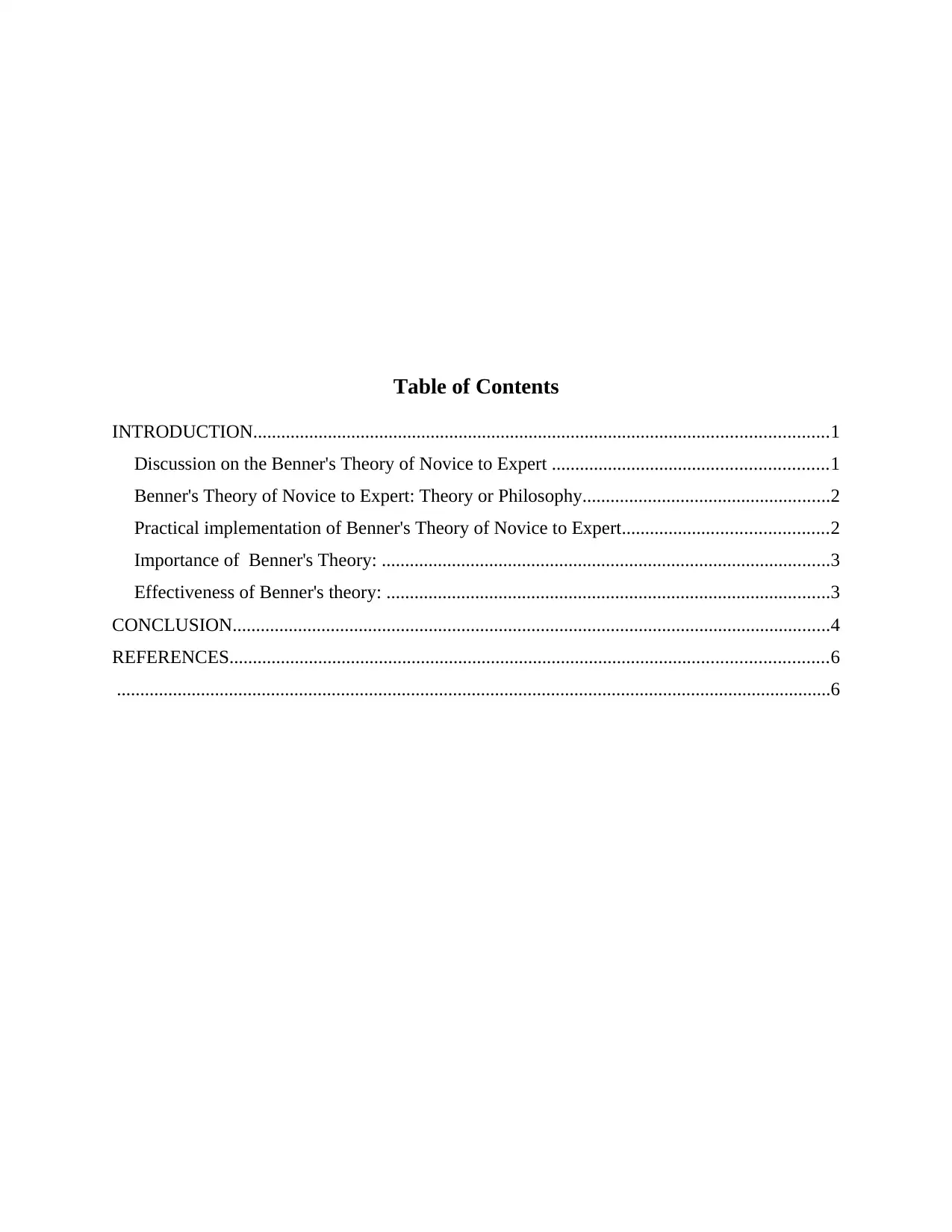
Table of Contents
INTRODUCTION...........................................................................................................................1
Discussion on the Benner's Theory of Novice to Expert ...........................................................1
Benner's Theory of Novice to Expert: Theory or Philosophy.....................................................2
Practical implementation of Benner's Theory of Novice to Expert............................................2
Importance of Benner's Theory: ................................................................................................3
Effectiveness of Benner's theory: ...............................................................................................3
CONCLUSION................................................................................................................................4
REFERENCES................................................................................................................................6
.........................................................................................................................................................6
INTRODUCTION...........................................................................................................................1
Discussion on the Benner's Theory of Novice to Expert ...........................................................1
Benner's Theory of Novice to Expert: Theory or Philosophy.....................................................2
Practical implementation of Benner's Theory of Novice to Expert............................................2
Importance of Benner's Theory: ................................................................................................3
Effectiveness of Benner's theory: ...............................................................................................3
CONCLUSION................................................................................................................................4
REFERENCES................................................................................................................................6
.........................................................................................................................................................6

⊘ This is a preview!⊘
Do you want full access?
Subscribe today to unlock all pages.

Trusted by 1+ million students worldwide
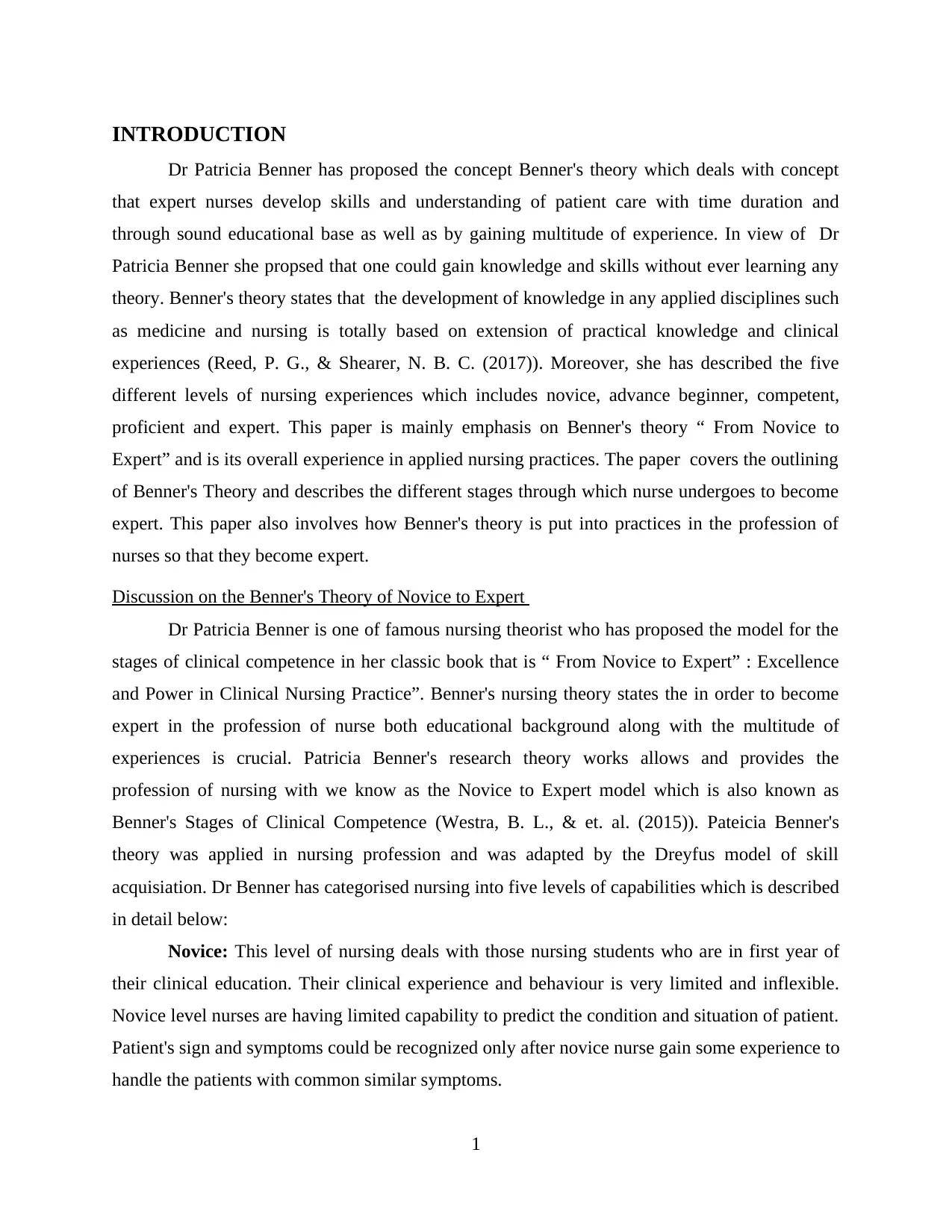
INTRODUCTION
Dr Patricia Benner has proposed the concept Benner's theory which deals with concept
that expert nurses develop skills and understanding of patient care with time duration and
through sound educational base as well as by gaining multitude of experience. In view of Dr
Patricia Benner she propsed that one could gain knowledge and skills without ever learning any
theory. Benner's theory states that the development of knowledge in any applied disciplines such
as medicine and nursing is totally based on extension of practical knowledge and clinical
experiences (Reed, P. G., & Shearer, N. B. C. (2017)). Moreover, she has described the five
different levels of nursing experiences which includes novice, advance beginner, competent,
proficient and expert. This paper is mainly emphasis on Benner's theory “ From Novice to
Expert” and is its overall experience in applied nursing practices. The paper covers the outlining
of Benner's Theory and describes the different stages through which nurse undergoes to become
expert. This paper also involves how Benner's theory is put into practices in the profession of
nurses so that they become expert.
Discussion on the Benner's Theory of Novice to Expert
Dr Patricia Benner is one of famous nursing theorist who has proposed the model for the
stages of clinical competence in her classic book that is “ From Novice to Expert” : Excellence
and Power in Clinical Nursing Practice”. Benner's nursing theory states the in order to become
expert in the profession of nurse both educational background along with the multitude of
experiences is crucial. Patricia Benner's research theory works allows and provides the
profession of nursing with we know as the Novice to Expert model which is also known as
Benner's Stages of Clinical Competence (Westra, B. L., & et. al. (2015)). Pateicia Benner's
theory was applied in nursing profession and was adapted by the Dreyfus model of skill
acquisiation. Dr Benner has categorised nursing into five levels of capabilities which is described
in detail below:
Novice: This level of nursing deals with those nursing students who are in first year of
their clinical education. Their clinical experience and behaviour is very limited and inflexible.
Novice level nurses are having limited capability to predict the condition and situation of patient.
Patient's sign and symptoms could be recognized only after novice nurse gain some experience to
handle the patients with common similar symptoms.
1
Dr Patricia Benner has proposed the concept Benner's theory which deals with concept
that expert nurses develop skills and understanding of patient care with time duration and
through sound educational base as well as by gaining multitude of experience. In view of Dr
Patricia Benner she propsed that one could gain knowledge and skills without ever learning any
theory. Benner's theory states that the development of knowledge in any applied disciplines such
as medicine and nursing is totally based on extension of practical knowledge and clinical
experiences (Reed, P. G., & Shearer, N. B. C. (2017)). Moreover, she has described the five
different levels of nursing experiences which includes novice, advance beginner, competent,
proficient and expert. This paper is mainly emphasis on Benner's theory “ From Novice to
Expert” and is its overall experience in applied nursing practices. The paper covers the outlining
of Benner's Theory and describes the different stages through which nurse undergoes to become
expert. This paper also involves how Benner's theory is put into practices in the profession of
nurses so that they become expert.
Discussion on the Benner's Theory of Novice to Expert
Dr Patricia Benner is one of famous nursing theorist who has proposed the model for the
stages of clinical competence in her classic book that is “ From Novice to Expert” : Excellence
and Power in Clinical Nursing Practice”. Benner's nursing theory states the in order to become
expert in the profession of nurse both educational background along with the multitude of
experiences is crucial. Patricia Benner's research theory works allows and provides the
profession of nursing with we know as the Novice to Expert model which is also known as
Benner's Stages of Clinical Competence (Westra, B. L., & et. al. (2015)). Pateicia Benner's
theory was applied in nursing profession and was adapted by the Dreyfus model of skill
acquisiation. Dr Benner has categorised nursing into five levels of capabilities which is described
in detail below:
Novice: This level of nursing deals with those nursing students who are in first year of
their clinical education. Their clinical experience and behaviour is very limited and inflexible.
Novice level nurses are having limited capability to predict the condition and situation of patient.
Patient's sign and symptoms could be recognized only after novice nurse gain some experience to
handle the patients with common similar symptoms.
1
Paraphrase This Document
Need a fresh take? Get an instant paraphrase of this document with our AI Paraphraser
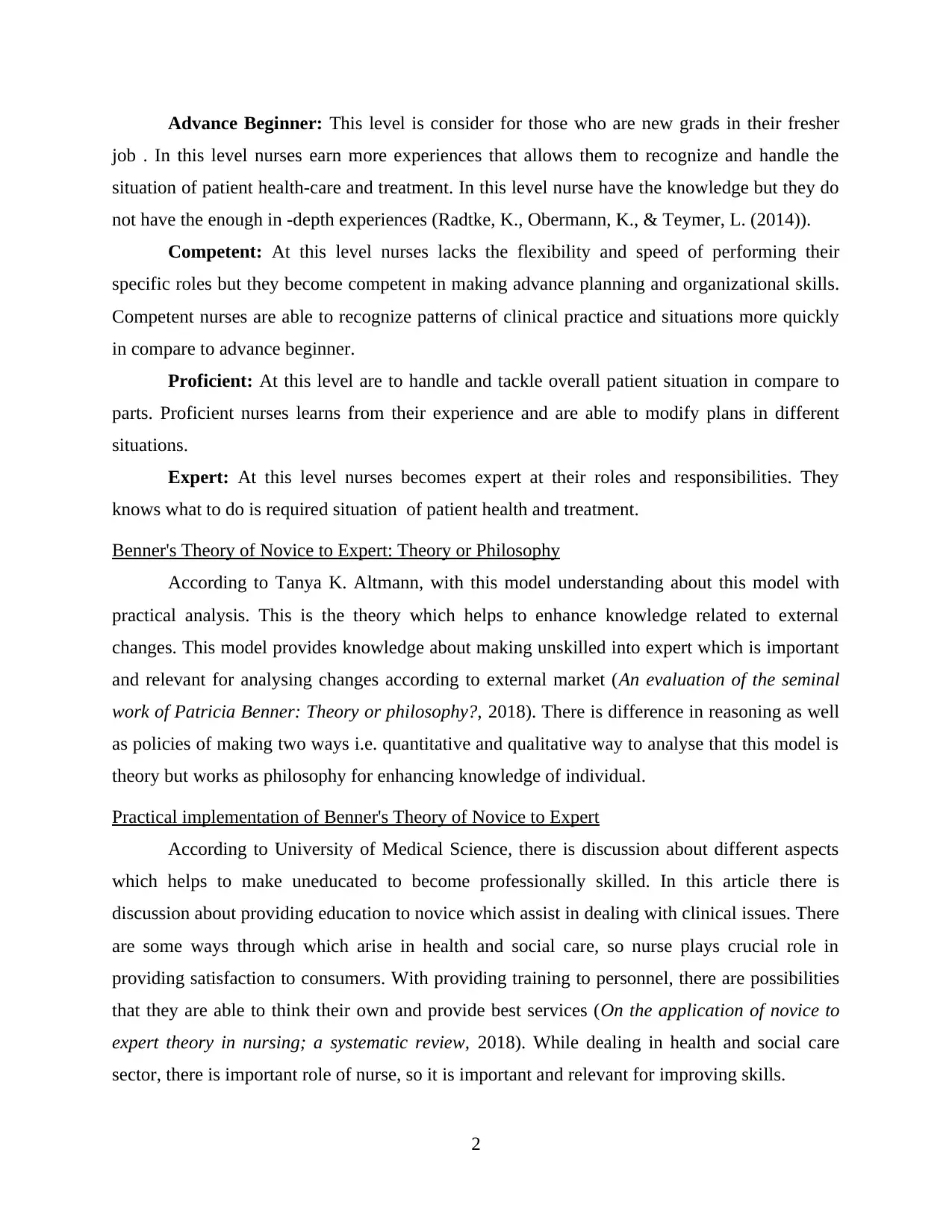
Advance Beginner: This level is consider for those who are new grads in their fresher
job . In this level nurses earn more experiences that allows them to recognize and handle the
situation of patient health-care and treatment. In this level nurse have the knowledge but they do
not have the enough in -depth experiences (Radtke, K., Obermann, K., & Teymer, L. (2014)).
Competent: At this level nurses lacks the flexibility and speed of performing their
specific roles but they become competent in making advance planning and organizational skills.
Competent nurses are able to recognize patterns of clinical practice and situations more quickly
in compare to advance beginner.
Proficient: At this level are to handle and tackle overall patient situation in compare to
parts. Proficient nurses learns from their experience and are able to modify plans in different
situations.
Expert: At this level nurses becomes expert at their roles and responsibilities. They
knows what to do is required situation of patient health and treatment.
Benner's Theory of Novice to Expert: Theory or Philosophy
According to Tanya K. Altmann, with this model understanding about this model with
practical analysis. This is the theory which helps to enhance knowledge related to external
changes. This model provides knowledge about making unskilled into expert which is important
and relevant for analysing changes according to external market (An evaluation of the seminal
work of Patricia Benner: Theory or philosophy?, 2018). There is difference in reasoning as well
as policies of making two ways i.e. quantitative and qualitative way to analyse that this model is
theory but works as philosophy for enhancing knowledge of individual.
Practical implementation of Benner's Theory of Novice to Expert
According to University of Medical Science, there is discussion about different aspects
which helps to make uneducated to become professionally skilled. In this article there is
discussion about providing education to novice which assist in dealing with clinical issues. There
are some ways through which arise in health and social care, so nurse plays crucial role in
providing satisfaction to consumers. With providing training to personnel, there are possibilities
that they are able to think their own and provide best services (On the application of novice to
expert theory in nursing; a systematic review, 2018). While dealing in health and social care
sector, there is important role of nurse, so it is important and relevant for improving skills.
2
job . In this level nurses earn more experiences that allows them to recognize and handle the
situation of patient health-care and treatment. In this level nurse have the knowledge but they do
not have the enough in -depth experiences (Radtke, K., Obermann, K., & Teymer, L. (2014)).
Competent: At this level nurses lacks the flexibility and speed of performing their
specific roles but they become competent in making advance planning and organizational skills.
Competent nurses are able to recognize patterns of clinical practice and situations more quickly
in compare to advance beginner.
Proficient: At this level are to handle and tackle overall patient situation in compare to
parts. Proficient nurses learns from their experience and are able to modify plans in different
situations.
Expert: At this level nurses becomes expert at their roles and responsibilities. They
knows what to do is required situation of patient health and treatment.
Benner's Theory of Novice to Expert: Theory or Philosophy
According to Tanya K. Altmann, with this model understanding about this model with
practical analysis. This is the theory which helps to enhance knowledge related to external
changes. This model provides knowledge about making unskilled into expert which is important
and relevant for analysing changes according to external market (An evaluation of the seminal
work of Patricia Benner: Theory or philosophy?, 2018). There is difference in reasoning as well
as policies of making two ways i.e. quantitative and qualitative way to analyse that this model is
theory but works as philosophy for enhancing knowledge of individual.
Practical implementation of Benner's Theory of Novice to Expert
According to University of Medical Science, there is discussion about different aspects
which helps to make uneducated to become professionally skilled. In this article there is
discussion about providing education to novice which assist in dealing with clinical issues. There
are some ways through which arise in health and social care, so nurse plays crucial role in
providing satisfaction to consumers. With providing training to personnel, there are possibilities
that they are able to think their own and provide best services (On the application of novice to
expert theory in nursing; a systematic review, 2018). While dealing in health and social care
sector, there is important role of nurse, so it is important and relevant for improving skills.
2
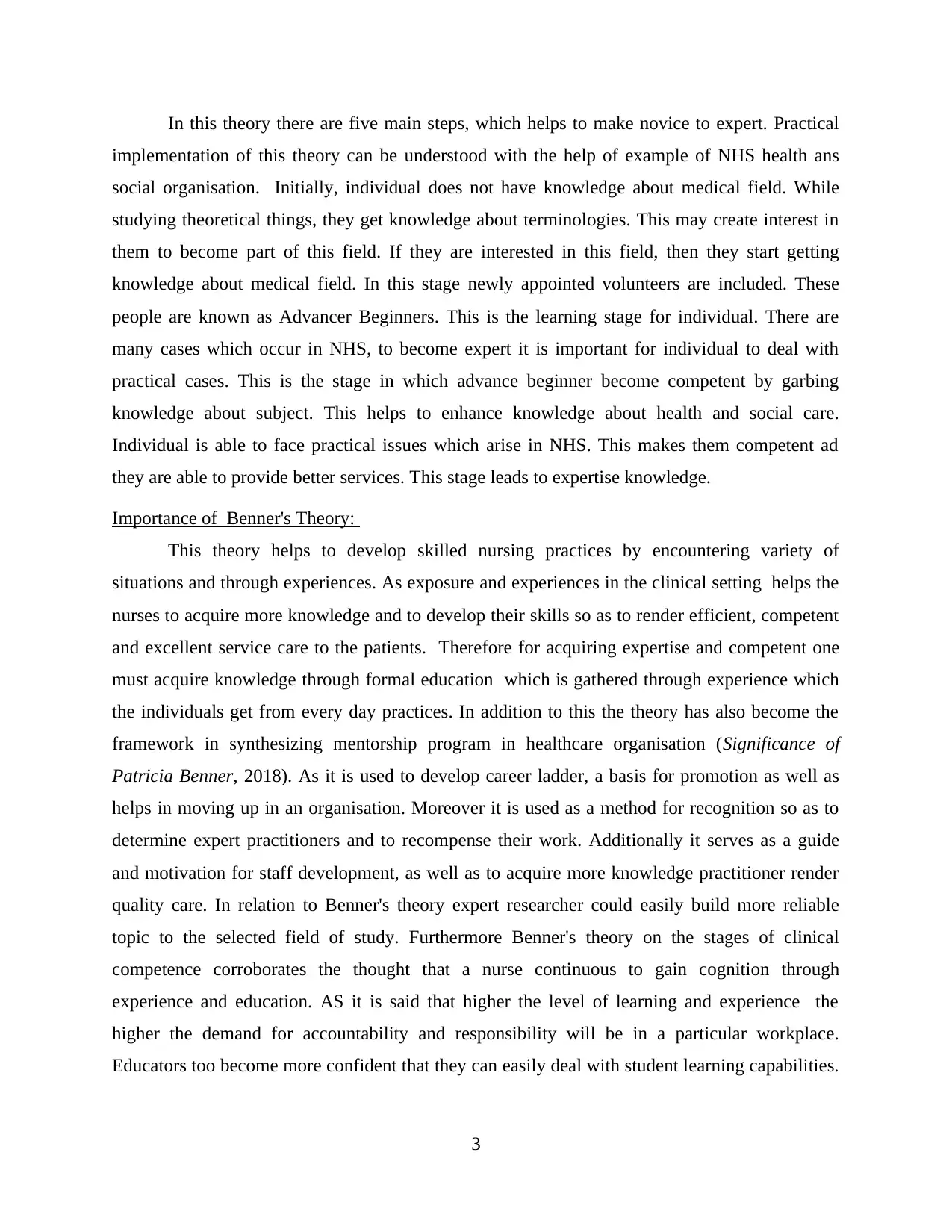
In this theory there are five main steps, which helps to make novice to expert. Practical
implementation of this theory can be understood with the help of example of NHS health ans
social organisation. Initially, individual does not have knowledge about medical field. While
studying theoretical things, they get knowledge about terminologies. This may create interest in
them to become part of this field. If they are interested in this field, then they start getting
knowledge about medical field. In this stage newly appointed volunteers are included. These
people are known as Advancer Beginners. This is the learning stage for individual. There are
many cases which occur in NHS, to become expert it is important for individual to deal with
practical cases. This is the stage in which advance beginner become competent by garbing
knowledge about subject. This helps to enhance knowledge about health and social care.
Individual is able to face practical issues which arise in NHS. This makes them competent ad
they are able to provide better services. This stage leads to expertise knowledge.
Importance of Benner's Theory:
This theory helps to develop skilled nursing practices by encountering variety of
situations and through experiences. As exposure and experiences in the clinical setting helps the
nurses to acquire more knowledge and to develop their skills so as to render efficient, competent
and excellent service care to the patients. Therefore for acquiring expertise and competent one
must acquire knowledge through formal education which is gathered through experience which
the individuals get from every day practices. In addition to this the theory has also become the
framework in synthesizing mentorship program in healthcare organisation (Significance of
Patricia Benner, 2018). As it is used to develop career ladder, a basis for promotion as well as
helps in moving up in an organisation. Moreover it is used as a method for recognition so as to
determine expert practitioners and to recompense their work. Additionally it serves as a guide
and motivation for staff development, as well as to acquire more knowledge practitioner render
quality care. In relation to Benner's theory expert researcher could easily build more reliable
topic to the selected field of study. Furthermore Benner's theory on the stages of clinical
competence corroborates the thought that a nurse continuous to gain cognition through
experience and education. AS it is said that higher the level of learning and experience the
higher the demand for accountability and responsibility will be in a particular workplace.
Educators too become more confident that they can easily deal with student learning capabilities.
3
implementation of this theory can be understood with the help of example of NHS health ans
social organisation. Initially, individual does not have knowledge about medical field. While
studying theoretical things, they get knowledge about terminologies. This may create interest in
them to become part of this field. If they are interested in this field, then they start getting
knowledge about medical field. In this stage newly appointed volunteers are included. These
people are known as Advancer Beginners. This is the learning stage for individual. There are
many cases which occur in NHS, to become expert it is important for individual to deal with
practical cases. This is the stage in which advance beginner become competent by garbing
knowledge about subject. This helps to enhance knowledge about health and social care.
Individual is able to face practical issues which arise in NHS. This makes them competent ad
they are able to provide better services. This stage leads to expertise knowledge.
Importance of Benner's Theory:
This theory helps to develop skilled nursing practices by encountering variety of
situations and through experiences. As exposure and experiences in the clinical setting helps the
nurses to acquire more knowledge and to develop their skills so as to render efficient, competent
and excellent service care to the patients. Therefore for acquiring expertise and competent one
must acquire knowledge through formal education which is gathered through experience which
the individuals get from every day practices. In addition to this the theory has also become the
framework in synthesizing mentorship program in healthcare organisation (Significance of
Patricia Benner, 2018). As it is used to develop career ladder, a basis for promotion as well as
helps in moving up in an organisation. Moreover it is used as a method for recognition so as to
determine expert practitioners and to recompense their work. Additionally it serves as a guide
and motivation for staff development, as well as to acquire more knowledge practitioner render
quality care. In relation to Benner's theory expert researcher could easily build more reliable
topic to the selected field of study. Furthermore Benner's theory on the stages of clinical
competence corroborates the thought that a nurse continuous to gain cognition through
experience and education. AS it is said that higher the level of learning and experience the
higher the demand for accountability and responsibility will be in a particular workplace.
Educators too become more confident that they can easily deal with student learning capabilities.
3
⊘ This is a preview!⊘
Do you want full access?
Subscribe today to unlock all pages.

Trusted by 1+ million students worldwide
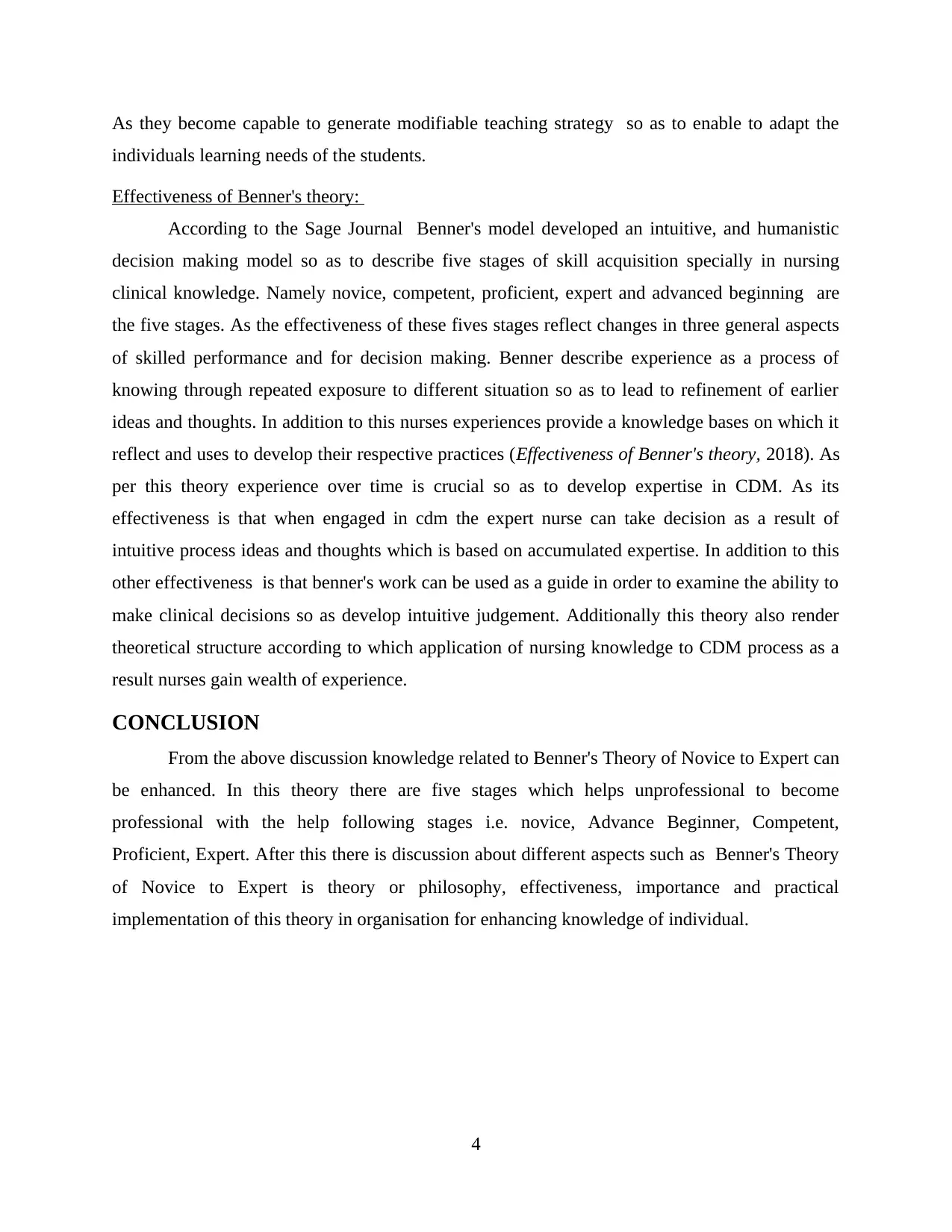
As they become capable to generate modifiable teaching strategy so as to enable to adapt the
individuals learning needs of the students.
Effectiveness of Benner's theory:
According to the Sage Journal Benner's model developed an intuitive, and humanistic
decision making model so as to describe five stages of skill acquisition specially in nursing
clinical knowledge. Namely novice, competent, proficient, expert and advanced beginning are
the five stages. As the effectiveness of these fives stages reflect changes in three general aspects
of skilled performance and for decision making. Benner describe experience as a process of
knowing through repeated exposure to different situation so as to lead to refinement of earlier
ideas and thoughts. In addition to this nurses experiences provide a knowledge bases on which it
reflect and uses to develop their respective practices (Effectiveness of Benner's theory, 2018). As
per this theory experience over time is crucial so as to develop expertise in CDM. As its
effectiveness is that when engaged in cdm the expert nurse can take decision as a result of
intuitive process ideas and thoughts which is based on accumulated expertise. In addition to this
other effectiveness is that benner's work can be used as a guide in order to examine the ability to
make clinical decisions so as develop intuitive judgement. Additionally this theory also render
theoretical structure according to which application of nursing knowledge to CDM process as a
result nurses gain wealth of experience.
CONCLUSION
From the above discussion knowledge related to Benner's Theory of Novice to Expert can
be enhanced. In this theory there are five stages which helps unprofessional to become
professional with the help following stages i.e. novice, Advance Beginner, Competent,
Proficient, Expert. After this there is discussion about different aspects such as Benner's Theory
of Novice to Expert is theory or philosophy, effectiveness, importance and practical
implementation of this theory in organisation for enhancing knowledge of individual.
4
individuals learning needs of the students.
Effectiveness of Benner's theory:
According to the Sage Journal Benner's model developed an intuitive, and humanistic
decision making model so as to describe five stages of skill acquisition specially in nursing
clinical knowledge. Namely novice, competent, proficient, expert and advanced beginning are
the five stages. As the effectiveness of these fives stages reflect changes in three general aspects
of skilled performance and for decision making. Benner describe experience as a process of
knowing through repeated exposure to different situation so as to lead to refinement of earlier
ideas and thoughts. In addition to this nurses experiences provide a knowledge bases on which it
reflect and uses to develop their respective practices (Effectiveness of Benner's theory, 2018). As
per this theory experience over time is crucial so as to develop expertise in CDM. As its
effectiveness is that when engaged in cdm the expert nurse can take decision as a result of
intuitive process ideas and thoughts which is based on accumulated expertise. In addition to this
other effectiveness is that benner's work can be used as a guide in order to examine the ability to
make clinical decisions so as develop intuitive judgement. Additionally this theory also render
theoretical structure according to which application of nursing knowledge to CDM process as a
result nurses gain wealth of experience.
CONCLUSION
From the above discussion knowledge related to Benner's Theory of Novice to Expert can
be enhanced. In this theory there are five stages which helps unprofessional to become
professional with the help following stages i.e. novice, Advance Beginner, Competent,
Proficient, Expert. After this there is discussion about different aspects such as Benner's Theory
of Novice to Expert is theory or philosophy, effectiveness, importance and practical
implementation of this theory in organisation for enhancing knowledge of individual.
4
Paraphrase This Document
Need a fresh take? Get an instant paraphrase of this document with our AI Paraphraser

5
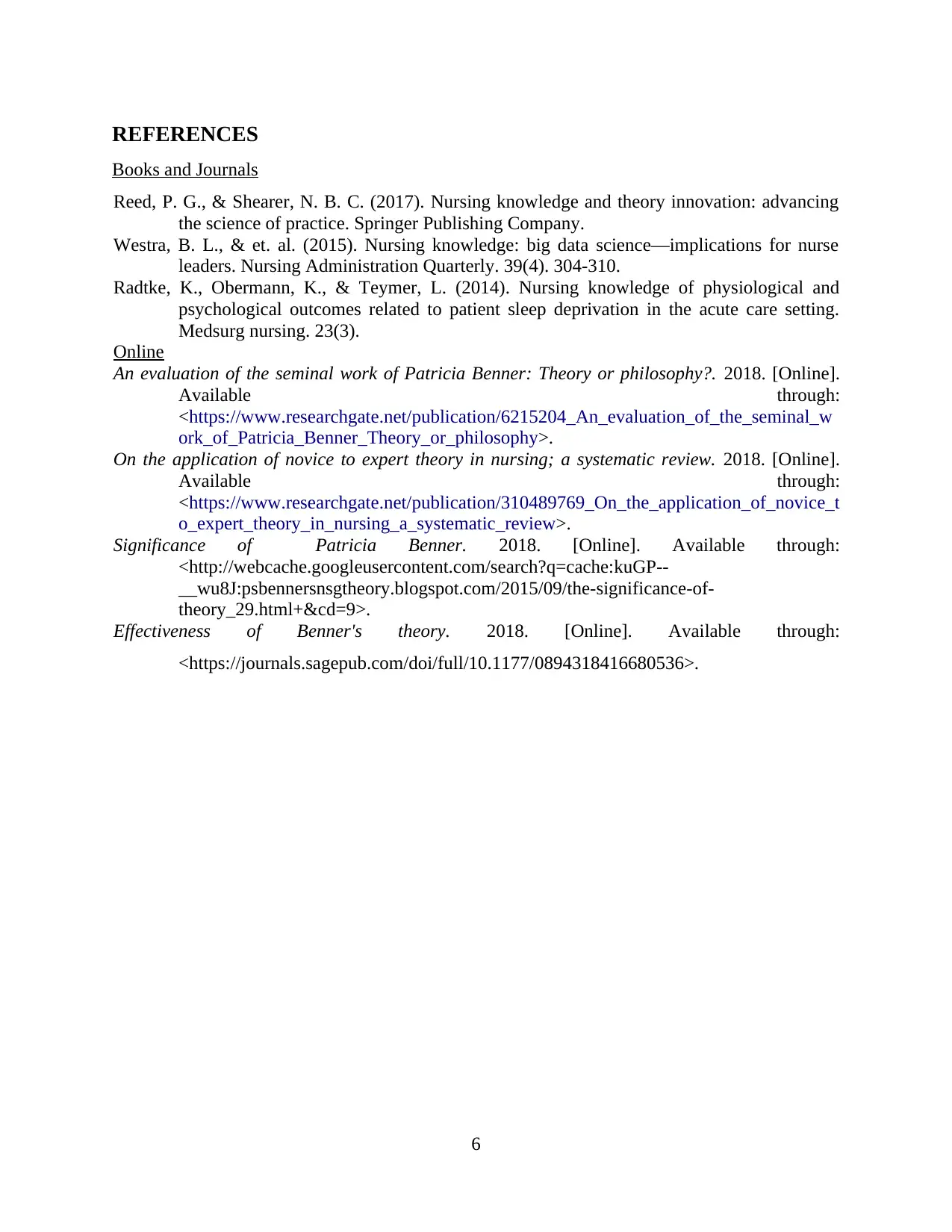
REFERENCES
Books and Journals
Reed, P. G., & Shearer, N. B. C. (2017). Nursing knowledge and theory innovation: advancing
the science of practice. Springer Publishing Company.
Westra, B. L., & et. al. (2015). Nursing knowledge: big data science—implications for nurse
leaders. Nursing Administration Quarterly. 39(4). 304-310.
Radtke, K., Obermann, K., & Teymer, L. (2014). Nursing knowledge of physiological and
psychological outcomes related to patient sleep deprivation in the acute care setting.
Medsurg nursing. 23(3).
Online
An evaluation of the seminal work of Patricia Benner: Theory or philosophy?. 2018. [Online].
Available through:
<https://www.researchgate.net/publication/6215204_An_evaluation_of_the_seminal_w
ork_of_Patricia_Benner_Theory_or_philosophy>.
On the application of novice to expert theory in nursing; a systematic review. 2018. [Online].
Available through:
<https://www.researchgate.net/publication/310489769_On_the_application_of_novice_t
o_expert_theory_in_nursing_a_systematic_review>.
Significance of Patricia Benner. 2018. [Online]. Available through:
<http://webcache.googleusercontent.com/search?q=cache:kuGP--
__wu8J:psbennersnsgtheory.blogspot.com/2015/09/the-significance-of-
theory_29.html+&cd=9>.
Effectiveness of Benner's theory. 2018. [Online]. Available through:
<https://journals.sagepub.com/doi/full/10.1177/0894318416680536>.
6
Books and Journals
Reed, P. G., & Shearer, N. B. C. (2017). Nursing knowledge and theory innovation: advancing
the science of practice. Springer Publishing Company.
Westra, B. L., & et. al. (2015). Nursing knowledge: big data science—implications for nurse
leaders. Nursing Administration Quarterly. 39(4). 304-310.
Radtke, K., Obermann, K., & Teymer, L. (2014). Nursing knowledge of physiological and
psychological outcomes related to patient sleep deprivation in the acute care setting.
Medsurg nursing. 23(3).
Online
An evaluation of the seminal work of Patricia Benner: Theory or philosophy?. 2018. [Online].
Available through:
<https://www.researchgate.net/publication/6215204_An_evaluation_of_the_seminal_w
ork_of_Patricia_Benner_Theory_or_philosophy>.
On the application of novice to expert theory in nursing; a systematic review. 2018. [Online].
Available through:
<https://www.researchgate.net/publication/310489769_On_the_application_of_novice_t
o_expert_theory_in_nursing_a_systematic_review>.
Significance of Patricia Benner. 2018. [Online]. Available through:
<http://webcache.googleusercontent.com/search?q=cache:kuGP--
__wu8J:psbennersnsgtheory.blogspot.com/2015/09/the-significance-of-
theory_29.html+&cd=9>.
Effectiveness of Benner's theory. 2018. [Online]. Available through:
<https://journals.sagepub.com/doi/full/10.1177/0894318416680536>.
6
⊘ This is a preview!⊘
Do you want full access?
Subscribe today to unlock all pages.

Trusted by 1+ million students worldwide
1 out of 9
Related Documents
Your All-in-One AI-Powered Toolkit for Academic Success.
+13062052269
info@desklib.com
Available 24*7 on WhatsApp / Email
![[object Object]](/_next/static/media/star-bottom.7253800d.svg)
Unlock your academic potential
Copyright © 2020–2026 A2Z Services. All Rights Reserved. Developed and managed by ZUCOL.





